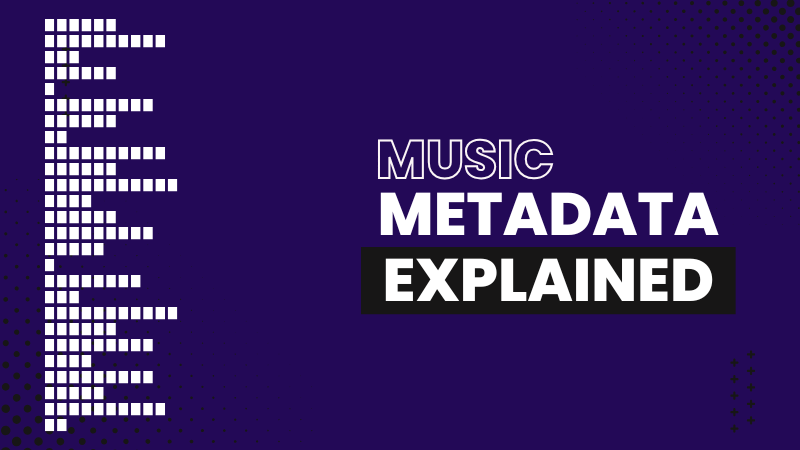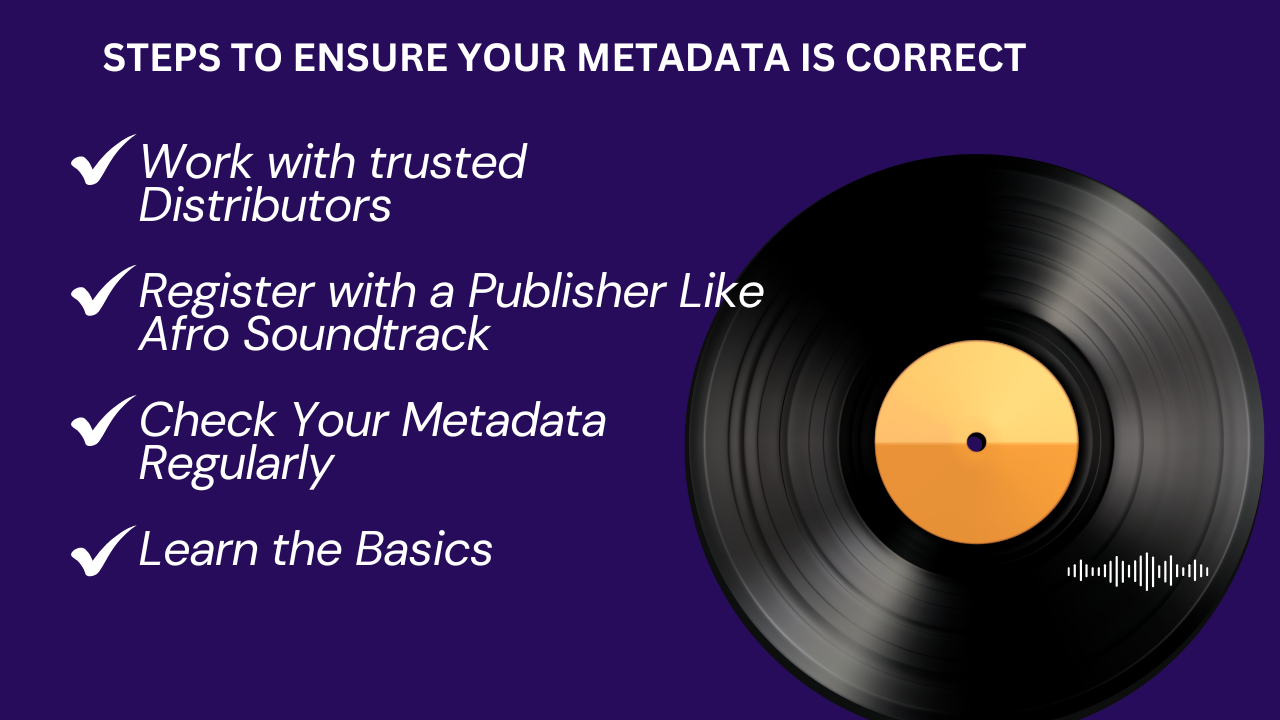Music Metadata Explained: The Key to Getting Paid in Nigeria’s Music Industry


Imagine pouring your heart into a track that takes off on streaming platforms worldwide. The views climb, playlists feature your sound, and fans from Lagos to Accra, to New York, to London, vibe to your rhythm. But when your royalty statement arrives, the payout is only a fraction of what you expected, or worse, nothing at all.
This is the reality for many Nigerian artists today. Too often, songs are released without properly tagging or managing metadata, leaving money unclaimed.
For a long time, piracy and shady deals have been blamed for lost income, but there is another, less visible culprit that can be even more damaging: missing or incorrect metadata.
With Afrobeats now topping global charts, the opportunities are huge. Yet not every artist is reaping the rewards.
Without an accurate metadata, you risk losing not only global recognition but also the royalties your music has rightfully earned.
What Is Music Metadata?
Music metadata is the structured information attached to a song file, serving as a kind of passport for your music.
It covers basic details like song title, artist name, album, genre, and release date, as well as technical identifiers such as ISRC codes (International Standard Recording Codes), IPI numbers for songwriters, and ownership splits.
These details are crucial in today’s streaming-driven industry, where nearly 70 percent of global music revenue comes from platforms like Spotify, Apple Music, and Boomplay.
Metadata ensures royalties flow back to the correct creators.
In simple terms, metadata is the digital fingerprint of your music.
Get it right, and you open doors to royalties, sync deals, and licensing worldwide. Get it wrong, and your earnings risk disappearing into the global “black box” of unclaimed royalties. Unmatched or ‘black box’ royalties consistently reach into the hundreds of millions or over a billion dollars globally per year with missing metadata frequently cited as a significant factor.
Key elements of music metadata include:
- ISRC (International Standard Recording Code): A unique identifier for each recording.
- Songwriters and Performers: Names of all contributors.
- Publisher Information: Details of who manages the rights.
- Track Title and Album: Basic identifiers for recognition.
- Genre and Language: For categorization and discovery.
These elements are what streaming platforms, radio stations, and licensing agencies depend on to track usage and distribute royalties accurately.
The Cost of Missing or Incorrect Metadata
Accurate metadata is the backbone of royalty collection. Every time a song is streamed, downloaded, or broadcast, platforms depend on this data to track usage and send payments to the right people. If the details are wrong or missing, royalties can be misattributed or lost entirely.
The Mechanical Licensing Collective (MLC) has disclosed hundreds of millions of dollars in unmatched royalties, some of which are linked to metadata errors. An audit from Word Collections estimates that more than 25% of mechanical royalties collected since MLC’s inception remain unpaid.
For Nigerian artists, the stakes are even higher.
Many depend on international streams for income, yet missing ISRC codes, misspelled names, or incomplete songwriter credits can leave their royalties stuck in the “black box” of unclaimed funds.
Here’s how meta-data fuels payments:
- Mechanical and performance royalties from streams and downloads flow when DSPs tag usage data with the correct ISRC.
- Performance royalties from radio, live shows, or TV require accurate songwriter IDs (IPI numbers) and work titles.
- Sync income from film, ads, or games rely on clear credit information to prevent disputes.
When metadata is clean, these systems work with accuracy. But even a small error like a missing code or an alias not properly registered can reroute earnings or cause them to vanish.
Beyond the money, metadata also improves discoverability on streaming platforms and ensures accurate data for career planning.
Each time a song is played, downloaded, or licensed, platforms and agencies use metadata to:
- Identify the Track: Ensuring the right song is credited.
- Determine the Rights Holders: Identifying who should receive payment.
- Calculate Earnings: Based on the usage and agreements in place.
Without this data, royalties can be misdirected or left unclaimed.
Common Metadata Pitfalls Robbing Nigerian Artists
Metadata mistakes are quiet money-drainers. They creep in through small errors that end up blocking or diverting royalties. Some of the most common include:
- Inaccurate Artist and Song Credits: A typo in your name, IPI number, or songwriter details can send royalties to the wrong person. Many Nigerian artists also forget to add producer credits, an oversight that can cost thousands.
- Missing ISRC and UPC Codes: These codes are essential for tracking songs and albums worldwide. Without them, streams cannot be matched to your work. Nigerian distributors sometimes create duplicate or incorrect codes, which splits or hides royalties.
- Incomplete Split Sheets: If ownership percentages in a song do not add up to 100%, disputes are inevitable. In collaborative Naija studio sessions, this is a common problem that delays payments.
- Tax and Location Errors: : Because Nigeria does not have a tax treaty with the United States, U.S.-source royalties paid to Nigerian artists are generally subject to a 30% withholding tax unless the artist provides valid tax documentation (such as a completed Form W-8BEN). Metadata of your songs does not replace IRS tax forms. However, proper documentation and correct information submitted to the payer are crucial in avoiding full withholding.
- Genre and Release Date Errors: Putting your song in the wrong genre makes it harder to land on the right playlists. Incorrect release dates can also block retroactive royalty collection.
Steps to Ensure Your Metadata Is Correct

Getting metadata right is not complicated, but it does require discipline. You can protect your earnings by following these steps:
- Work with Trusted Distributors: Pick digital distributors that take metadata seriously and generate correct ISRC and UPC codes.
- Register with a Publisher Like AfroSoundTrack: A publisher ensures your music is properly registered, monitored, and linked to the right identifiers globally.
- Check Your Metadata Regularly: Audit your catalog every few months to confirm that titles, credits, and codes are correct.
- Learn the Basics: Understanding how metadata fuels royalties puts you in control. The more you know, the fewer mistakes slip through.
The Role of Music Publishers in Managing Meta-data for Nigerian artists
Music publishers are the quiet engines that make sure artists get paid. One of their biggest responsibilities is managing metadata. A good publisher ensures that:
- Metadata is accurate before a song goes out for distribution.
- Royalties are collected from streaming platforms, performing rights organizations, and licensing bodies worldwide.
- Rights are protected in case of disputes or copyright infringements.
For Nigerian artists, this support is more crucial than ever. With Afrobeats now crossing borders every day, even a small metadata error can lead to lost income or misattributed credits. A professional publisher steps in to handle the technical details that many artists overlook.
That is where AfroSoundTrack comes in. We specialize in publishing for African creators, making sure songs are properly registered, metadata is airtight, and royalties get home safely. We protect your rights and grow your earnings while you focus on making music.
Afro Soundtrack: Music Publishing and Royalty Administration for African Artists
At Afro Soundtrack, we make sure your music works as hard as you do. Our publishing and royalty administration services are built to:
- Ensure accurate metadata by properly tagging and registering every song.
- Collect global royalties from streaming platforms, sync placements, and licensing deals.
- Protect your rights and handle disputes so no income is left unclaimed.
We have helped many Nigerian and African artists, producers, and songwriters earn royalties and sync income with many of them receiving publishing revenue for the very first time.
If you are aiming to turn global streams into fair compensation, AfroSoundTrack is your trusted partner.
We make sure every play, every download, and every license is tracked and paid.
Get in touch today to secure your music publishing future.

Comments
This post currently has no comments.